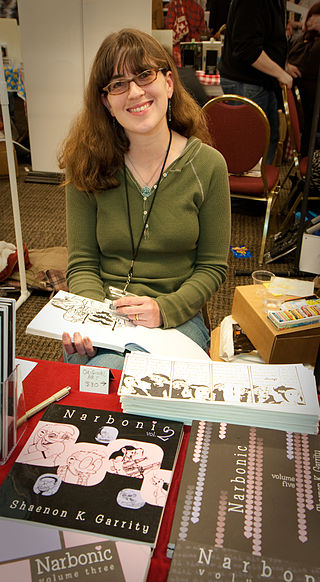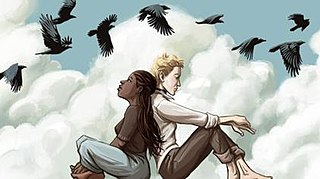Webcomics are comics published on the internet, such as on a website or a mobile app. While many webcomics are published exclusively online, others are also published in magazines, newspapers, or comic books.

Fetus-X was a weekly romantic horror comic written and drawn by Eric Millikin and Casey Sorrow. Millikin is an American artist and former human anatomy lab embalmer and dissectionist. Sorrow is an internationally known American illustrator and printmaker.

Modern Tales was a webcomics publisher active from 2002 to 2012, best known for being one of the first profitable subscription models for digital content. Joey Manley was the website's publisher and original editor. The site featured a roster of approximately 30 professional webcomic artists. Shaenon Garrity, one of the site's original artists, took over as the publication's editor in 2006. Other Modern Tales artists included Gene Luen Yang, James Kochalka, Dorothy Gambrell, Harvey Pekar and Will Eisner.

Joey Manley was an American LGBT fiction author, web designer, and webcomics publisher. Manley wrote the successful LGBT novel The Death of Donna-May Dean in 1992. He moved to San Francisco in 2000 in order to work in web design. Manley was the founder and publisher of the Modern Tales family of webcomics websites, which included Modern Tales, Serializer, Girlamatic, Webcomics Nation, and others. Manley is considered one of the "founding pioneers" of the webcomic movement for creating a then-revolutionary subscription model.
Serializer.net was a webcomic subscription service and artist collective published by Joey Manley and edited by Tom Hart and Eric Millikin that existed from 2002 to 2013. Designed to showcase artistic alternative webcomics using the unique nature of the medium, the works on Serializer.net were described by critics as "high art" and "avant-garde". The project became mostly inactive in 2007 and closed alongside Manley's other websites in 2013.

Doctor Fun is a single-panel, gag webcomic by David Farley. It began in September 1993, making it one of the earliest webcomics, and ran until June 2006. Doctor Fun was part of United Media's website from 1995, but had parted ways by 2003. The comic was one of the longest-running webcomics before it concluded, having run for nearly thirteen years with over 2,600 strips. The webcomic has been compared to The Far Side.

Narbonic is a webcomic written and drawn by Shaenon K. Garrity. The storylines center on the misadventures of the staff of the fictional Narbonic Labs, which is the domain of mad scientist Helen Narbon. The strip started on July 31, 2000, and finished on December 31, 2006. On January 1, 2007, Garrity launched the "Director's Cut", an "annotated replay" of Narbonic. Narbonic was part of the subscription-based Modern Tales website for several years but moved to Webcomics Nation in July 2006, where it resumed being free-to-read. The comic is also a member of The Nice comics collective.

Shaenon K. Garrity is an American webcomic creator and science-fiction author best known for her webcomics Narbonic and Skin Horse. She collaborated with various artists to write webcomics for the Modern Tales-family of webcomic subscription services in the early 2000s, and write columns for various comics journals. Since 2003, Garrity has done freelance editing for Viz Media on various manga translations.
Girlamatic was a webcomic subscription service launched by Joey Manley and Lea Hernandez in March 2003. It was the third online magazine Manley established as part of his Modern Tales family of websites. Girlamatic was created as a place where both female artists and readers could feel comfortable and featured a diverse mix of genres. When the site launched, the most recent webcomic pages and strips were free, and the website's archives were available by subscription. The editorial role was held by Hernandez from 2003 until 2006, when it was taken over by Arcana Jayne-creator Lisa Jonté, one of the site's original artists. In 2009, Girlamatic was relaunched as a free digital magazine, this time edited by Spades-creator Diana McQueen. The archives of the webcomics that ran on Girlamatic remained freely available until the website was discontinued in 2013.

Dicebox, by American cartoonist Jenn Manley Lee, is a science fiction webcomic which has been hosted at the subscription-based comics anthology site Girlamatic. The comic, planned for four books totalling 36 chapters, is set in the space-travelling future and is primarily the story of one year in the lives of two women factory workers, Griffen Medea Stoyka and Molly Robbins.

Eric Millikin is an American artist and activist based in Detroit, Michigan, and Richmond, Virginia. He is known for his pioneering work in artificial intelligence art, augmented and virtual reality art, conceptual art, Internet art, performance art, poetry, post-Internet art, video art, and webcomics. His work is often controversial, with political, romantic, occult, horror and black comedy themes. Awards for Millikin's artwork include the Pulitzer Prize and Emmy Award.
Project Wonderful was an advertising service created by programmer and webcomic author Ryan North in late 2006. Headquartered in Toronto, Ontario, the service supported up thousands of webcomics and blogs with auctioned online advertisements, until it was shut down in 2018.
Andrew Farago is the curator of the Cartoon Art Museum in San Francisco, author, chairman of the Northern California chapter of the National Cartoonists Society, and husband of webcomics author and illustrator Shaenon K. Garrity.
The history of webcomics follows the advances of technology, art, and business of comics on the Internet. The first comics were shared through the Internet in the mid-1980s. Some early webcomics were derivatives from print comics, but when the World Wide Web became widely popular in the mid-1990s, more people started creating comics exclusively for this medium. By the year 2000, various webcomic creators were financially successful and webcomics became more artistically recognized.
Notable events of 2003 in webcomics.

In contrast with mainstream American comics, webcomics are primarily written and drawn by women and gender variant people. Because of the self-published nature of webcomics, the internet has become a successful platform for social commentary, as well as lesbian, gay, bisexual, and transgender (LGBT) expression.
Notable events of 2005 in webcomics.
The business of webcomics involves creators earning a living through their webcomic, often using a variety of revenue channels. Those channels may include selling merchandise such as t-shirts, jackets, sweatpants, hats, pins, stickers, and toys, based on their work. Some also choose to sell print versions or compilations of their webcomics. Many webcomic creators make use of online advertisements on their websites, and possibly even product placement deals with larger companies. Crowdfunding through websites such as Kickstarter and Patreon are also popular choices for sources of potential income.
Notable events of the late 1990s in webcomics.
ComicSpace was an online social network and webcomic hosting service created and managed by Josh Roberts and Joey Manley between 2006 and 2012. The website was inspired by MySpace and was intended as a place where writers, artists, publishers, and fans could interact and share their work. Though ComicSpace was highly successful upon launch, it never fully took off. Roberts and Manley expanded the scope of the project with the help of investment firm E-Line Ventures in 2007, and Manley began merging his existing websites into ComicSpace, starting with Webcomics Nation. By 2012, interest in ComicSpace had waned, and Roberts and Manley abandoned the project.









